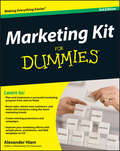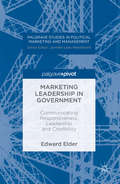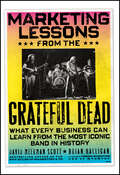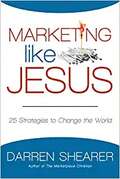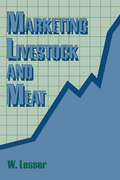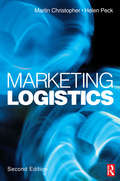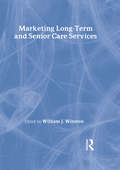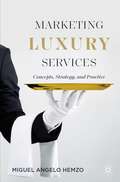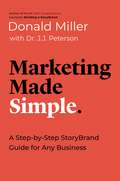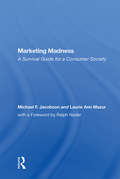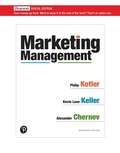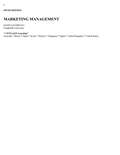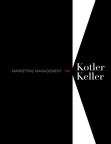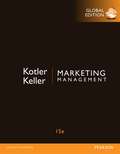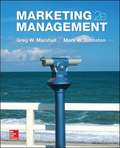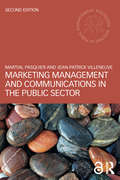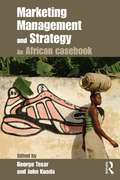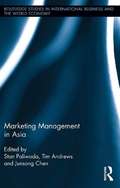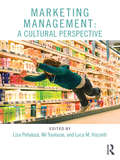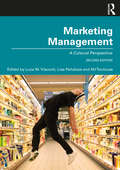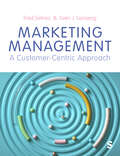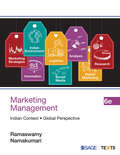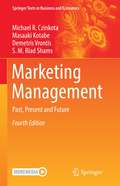- Table View
- List View
Marketing Kit for Dummies
by Alexander HiamThe forms, letters, and other tools included in Marketing Kit For Dummies, 3rd Edition enable readers to start a successful marketing program from the beginning. The expert tips and information presented in the book take some of the mystery out of marketing and explain, step-by-step, how to implement and execute a successful marketing strategy.Note: CD-ROM/DVD and other supplementary materials are not included as part of eBook file.
Marketing Leadership in Government
by Edward ElderThis book explores how contemporary governing leaders can overcome the typical trend of losing a public support in power by following more effective communication strategies. It shows how new forms of communication that emphasise acknowledgement and respect for public criticisms and concerns can be used by governing leaders to show the public that they still have the leadership qualities they entered office with, despite the extra challenges that political office presents. The book outlines a new model, The Contemporary Governing Leaders' Communication Model, through which leaders can communicate their positive personal and professional qualities in government. The book illustrates this model in use through the communication of United States President Barack Obama and New Zealand Prime Minister John Key during their first terms in political office.
Marketing Lessons from the Grateful Dead
by Scott Brian Halligan David Meerman Bill WaltonThe Grateful Dead-rock legends, marketing pioneers The Grateful Dead broke almost every rule in the music industry book. They encouraged their fans to record shows and trade tapes; they built a mailing list and sold concert tickets directly to fans; and they built their business model on live concerts, not album sales. By cultivating a dedicated, active community, collaborating with their audience to co-create the Deadhead lifestyle, and giving away "freemium" content, the Dead pioneered many social media and inbound marketing concepts successfully used by businesses across all industries today. Written by marketing gurus and lifelong Deadheads David Meerman Scott and Brian Halligan, Marketing Lessons from the Grateful Dead gives you key innovations from the Dead's approach you can apply to your business. Find out how to make your fans equal partners in your journey, "lose control" to win, create passionate loyalty, and experience the kind of marketing gains that will not fade away!
Marketing Like Jesus: 25 Strategies To Change The World
by Darren ShearerNo function is more important to an organization than marketing (strategic influence), and nobody has done it more effectively that Jesus Christ. If the most influential man in history (Jesus Christ) taught a class on marketing (strategic influence), what would he say? Whether as a politician trying to win more votes, a pastor trying to get more members, a businessperson trying to sell more products or services, or a non-profit trying to recruit more supporters...we’re all marketers that are trying to strategically influence the world around us. In Marketing like Jesus, you’ll discover 25 marketing strategies that Jesus used to change the world. You’ll also learn how other people and organizations have successfully applied the Marketing like Jesus strategies in business, government, education, entertainment, and nonprofits.
Marketing Livestock and Meat
by William H LesserThis groundbreaking volume presents a comprehensive view of the many concerns of those involved with livestock and meat marketing. During the 1980s, livestock production faced some critical changes. Product and feed prices became less stable, cycles lost their century-old patterns, both competition and trade barriers seemed to rise, and market outlets shrank in number and ownership diversity. At the same time, the United States demography became increasingly older, while new and confusing health concerns about red meat arose rapidly. This practical book introduces the reader to a range of issues of the livestock marketing system and looks ahead to such future issues as biotechnology, human health, and food safety. Considerable interest is given to international trade, an increasingly important sector in the market.Marketing Livestock and Meat is a concise and convenient compendium of diverse information. It provides functionaries in the system with an overall concept of how the market functions as a whole to promote better skills and strategies for marketing of red meats. The author describes specific applications vital to successful operation of the complex and far-reaching marketing system of meat and livestock, including international trade, grades and grading, health matters, demand for meat, price reporting and electronic markets, costs and benefits, and their combination into marketing strategies for producers. To supplement the research, theories, and strategies presented in this important book, there are many charts, graphs, and photographs. All persons connected to the marketing of meat and livestock--undergraduate students in North America, foreign students interested in exporting meat to the U. S., and most segments of the livestock sector, including supply and processing firms and retailers--will benefit from this important book.
Marketing Logistics (Marketing Ser.)
by Martin Christopher Helen PeckThis interface is being recognized by business organizations as a key priority for management, and both practitioners and academics alike have placed a greater emphasis on the need to view the supply chain as a whole as the vehicle by which competitive advantage is achieved. As well as drawing upon current research and the experience of firms worldwide, Marketing Logistics uses numerous 'mini-cases' and vignettes to illustrate the key messages in each chapter and bring the theory to life.This book is an invaluable resource for managers who seek to understand more about the way in which the supply chain should be managed to improve their organization's competitive position, as well as students undertaking degree-level courses in marketing, logistics and supply chain management.
Marketing Long-Term and Senior Care Services
by William WinstonHere is detailed, practical advice for the administrator or practitioner of long-term and senior care services. Experts offer effective techniques for increasing the visibility and scope of those services through modern marketing practices.
Marketing Luxury Services: Concepts, Strategy, and Practice
by Miguel Angelo HemzoThis textbook discusses luxury marketing management, considering the broader range of decisions related to the complexities of offering luxury as services. Placing a strong emphasis on strategy as well as positioning and the market, it focuses on the challenges in luxury related to the traditional 4 Ps (Products, Place, Promotion and Price), in addition applying the service-dominant logic to luxury management in relation to the other 4 Ps in marketing decisions (People, Process, Panorama, and Productivity).The text opens with an exploration the history and evolution of the concept and definition of luxury and the effect upon the practice of luxury marketing today, concluding with an overview of the contemporary luxury market, description of the main players, and relevant industry trends. It then discusses marketing strategies as applied to the luxury market, including market identification, brand communication, product positioning, pricing, flow of goods, foreign market entry, and more.With contributions from luxury marketing practitioners to offer practical knowledge as well as real world cases studies, this textbook will equip students with a comprehensive understanding of marketing in the luxury industry and the tools necessary to be successful in the management of luxury brands.
Marketing Made Simple: A Step-by-Step StoryBrand Guide for Any Business
by Donald Miller Dr. J.J. PetersonBased on Building a StoryBrand by New York Times bestselling author Donald Miller, this checklist is a strategic and actionable guide to applying the StoryBrand framework to any brand and an essential part of any marketing professional&’s tool kit.Every day, brands lose millions of dollars simply because they do not have a clear message that tells consumers who they are and what value they will add to their customers&’ lives. To solve this dilemma, Donald Miller wrote Building a StoryBrand, which has become the quintessential guide for anyone looking to craft or strengthen their brand&’s message.Now, Don is taking it a step further with this five-part checklist that helps marketing professionals and business owners apply the StoryBrand messaging framework across key customer touchpoints to effectively develop, strengthen, and communicate their brand&’s story to the marketplace.Praise for Marketing Made Simple"I created collateral for a client and they recently told me not to release the next round we created because they can&’t handle the influx of customers from the first round. They had more listings this year than in 30 years of business." - Amy Burgess, Marketing Consultant"My last email campaign I delivered raised $20k. Thank you Donald Miller for giving me a system that I know works." - Ian Stewart, Owner/Creative Director of Root Source Digital"A client went from $15MM last year to $27MM so far this year. All from updating their messaging and implementing new lead generators and email campaigns.- Wes Gay, CEO Wayfinder"Just heard from one of my clients that she&’s getting 18 ideal client leads a day from her website. Before we redid her wireframe, she averaged around 1-3 leads a week. And that&’s just with updating her website." - Amy Schutte, Owner of Hudson and Co LLC
Marketing Madness: A Survival Guide For A Consumer Society (Critical Studies In Comm And In Cultural Industries Ser.)
by Michael JacobsonIn 1983, Reese's Pieces made their debut on the silver screen, gobbled up by that lovable alien ET, and sales of the candy shot up instantly by 66 percent. Reebok has sponsored the U.S. Olympic team-and the Russian team, as well! The British Boy Scouts sell space on their merit badges to advertisers. Michael Jacobson, founder of the Washington, D.C
Marketing Management
by Philip Kotler Kevin Keller Alexander ChernevMarketing Managementcollectively uses a managerial orientation, an analytical approach, a multidisciplinary perspective, universal applications, and balanced coverage to distinguish it from all other marketing management texts out there. Unsurpassed in its breadth, depth, and relevance, the 16th Edition features a streamlined organization of the content, updated material, and new examples that reflect the very latest market developments. After reading this landmark text, you'll have the knowledge and tools to succeed in the new market environment around you.
Marketing Management
by Dawn IacobucciNow you can master the core concepts in marketing management that you need as a undergraduate marketing major, first-year MBA or EMBA student with the detailed material in Iacobacci's MARKETING MANAGEMENT, 5E. You are able to immediately apply the key concepts you learn to cases, group work, or simulations that are assigned in your course. MARKETING MANAGEMENT, 5E reflects the dynamic environment facing today's marketers. Engaging explanations, timely cases and memorable examples help you understand how an increasingly competitive global marketplace and current changes in technology affect the marketing decisions that today's managers must make every day.
Marketing Management (14th Edition)
by Philip Kotler Kevin Lane KellerStay on the cutting-edge with the gold standard text that reflects the latest in marketing theory and practice. Marketing Management is the gold standard marketing text because its content and organization consistently reflect the latest changes in today's marketing theory and practice. Remaining true to its gold-standard status, the fourteenth edition includes an overhaul of new material and updated information, and now is available with mymarketinglab--Pearson's online tutorial and assessment platform.
Marketing Management (15th Global Edition)
by Philip Kotler Kevin Lane KellerThe 15th edition of Marketing Management is a landmark entry in the long successful history of the market leader. With the 15th edition, great care was taken to provide an introductory guide to marketing management that truly reflects the modern realities of marketing.
Marketing Management (Second Edition)
by Greg W. Marshall Mark W. JohnstonThis title effectively captures and communicates to students how marketing management is really practiced in the 21st century world of business.
Marketing Management and Communications in the Public Sector (Masters in Public Management)
by Martial Pasquier Jean-Patrick VilleneuveThis updated edition of Marketing Management and Communications in the Public Sector provides a thorough overview of the major concepts in public sector marketing and communications, two fields that have continued to grow in importance for modern public administrations. With extended coverage of topics such as social marketing and institutional communication, the authors skilfully build on the solid foundations laid down in the previous edition. Replete with real-world case studies and examples, including new material from the USA, Australia, and Asia, this book gives students a truly international outlook. Additional features include exercises and discussion questions in each chapter and an illustrative extended case study. This refreshed text is essential reading for postgraduate students on public management degrees, and aspiring or current public managers. The Open Access version of this book, available at http://www.taylorfrancis.com/books/e/9781315622309, has been made available under a Creative Commons Attribution-Non Commercial-No Derivatives 4.0 license.
Marketing Management and Strategy: An African Casebook
by George TesarThis book gives readers an understanding of the factors that shape the marketing decisions of managers who operate in African economies. It brings together fifteen African cases written by scholars and executives with rich knowledge of business practices in Africa. By combining theoretical insights with practical information from the cases, the reader is introduced to issues relating to marketing strategy formulation, managerial actions in designing and implementing marketing decisions, as well as the operational contexts within which these actions are taken. The book is essential reading for both undergraduate and graduate students in marketing, international strategy and international business who require an understanding of African business.
Marketing Management in Africa
by George Tesar Steven W. Anderson Hassimi Traore Jens GraffThis book focuses on strategies for developing consumer markets in Africa using concepts and techniques from marketing, entrepreneurship, and project management. The authors argue that entrepreneurial activity in Africa is rapid, but limited, and requires a structured approach to drive success. Beginning with an introductory chapter that frames the socio-economic and technological developments in Africa, readers are introduced to the conceptual model that provides this structured approach in four logical parts: The creative stage Entrepreneurial and enterprise activities Understanding consumer behavior and market segments A project management-based framework. This multidisciplinary approach is supplemented with many examples and cases from a variety of sectors including health care, wind and solar power, and mobile technology. Through these, readers are able to understand how the model is implemented in reality to drive innovative economic and social development. Marketing Management in Africa will prove a valuable companion to any student of marketing or entrepreneurship with a particular interest in Africa.
Marketing Management in Asia. (Routledge Studies in International Business and the World Economy)
by Tim Andrews Stan Paliwoda Junsong ChenAsia is no longer simply the continent to which the world turns for outsourcing and off shoring of production, leaving retailing to Western countries. Asia now contains many of the world’s largest markets plus many emergent markets as well. North America is fast ceding ground to China as the world’s largest economic power. Europe has been able to make productivity gains from trade, fiscal and monetary harmonization to remain globally competitive while Africa, whose nations practice free trade, is largely ignored both in terms of forgiving debt and providing further credit. Each chapter of this volume details the characteristics of an individual market in Asia and demonstrates the challenges that marketers are likely to face in these environments. Covering not just production or consumption but trade as it is practiced now, this book outlines the new norms, conventions and service performance levels that these markets demand.
Marketing Management: A Cultural Perspective
by Lisa Peñaloza Nil Toulouse Luca M. ViscontiCulture pervades consumption and marketing activity in ways that potentially benefit marketing managers. This book provides a comprehensive account of cultural knowledge and skills useful in strategic marketing management. In making these cultural concepts and frameworks accessible and in discussing how to use them, this edited textbook goes beyond the identification of historical, socio-cultural and political factors and their effects on market outcomes. It builds understanding of the cultural symbols, world views, and practices at the heart of organizations and consumer collectives to better comprehend their relationships in markets. This book highlights the benefits that managers can reap from applying interpretive cultural approaches across the realm of strategic marketing activities including: market segmentation, product and brand positioning, market research, pricing, product development, advertising, and retail distribution, among others. With global contributions grounded in the authors’ primary research with companies such as General Motors, Camper, Prada, Mama Shelter, Kjaer Group, Hom, and the Twilight Community, this edited volume delivers a truly innovative marketing textbook. Marketing Management: A Cultural Perspective brings a timely and relevant learning resource to marketing students, lecturers, and managers across the world.
Marketing Management: A Cultural Perspective (Forschungs-/entwicklungs-/innovations-management Ser.)
by Visconti Luca M. Peñaloza Lisa Toulouse NilCulture pervades consumption and marketing activity in ways that potentially benefit marketing managers. This book provides a comprehensive account of cultural knowledge and skills useful in strategic marketing management. In making these cultural concepts and frameworks accessible and in discussing how to use them, this edited textbook goes beyond the identification of historical, sociocultural, and political factors impinging upon consumer cultures and their effects on market outcomes. This fully updated and restructured new edition provides two new introductory chapters on culture and marketing practice and improved pedagogy, to give a deeper understanding of how culture pervades consumption and marketing phenomena; the way market meanings are made, circulated, and negotiated; and the environmental, ethical, experiential, social, and symbolic implications of consumption and marketing. The authors highlight the benefits that managers can reap from applying interpretive cultural approaches across the realm of strategic marketing activities including: market segmentation, product and brand positioning, market research, pricing, product development, advertising, and retail distribution. Global contributions are grounded in the authors’ primary research with a range of companies including Cadbury’s Flake, Dior, Dove, General Motors, HOM, Hummer, Kjaer Group, Le Bon Coin, Mama Shelter, Mecca Cola, Prada, SignBank, and the Twilight community. This edited volume, which compiles the work of 58 scholars from 14 countries, delivers a truly innovative, multinationally focused marketing management textbook. Marketing Management: A Cultural Perspective is a timely and relevant learning resource for marketing students, lecturers, and managers across the world.
Marketing Management: A Customer-Centric Approach
by Fred Selnes Even Johan LansengThis textbook introduces students to the field of marketing management by emphasizing a customer-centric approach, which involves defining the purpose of marketing as the recruitment, defence, leverage, and development of customer/brand relationships. Because customers vary in their needs for products and services and their relationships with brands, you′ll discover how segmentation and differentiation play a crucial role in marketing management. After delving into market dynamics, customer behaviour, and market communications, you′ll explore the three main areas within marketing management: customer portfolio management, product portfolio management, and brand portfolio management. Finally, you′ll gain insights into developing marketing/business strategies and plans for success through comprehensive analysis, resource allocation, budgeting, and measuring key performance indicators. Features include case studies to bring theory to life, further reading suggestions to expand your understanding, and a marketing planning template to practice applying your knowledge to a real business scenario. Suitable for undergraduate/bachelor and postgraduate students studying Marketing Management and Strategic Marketing. Fred Selnes is a professor of marketing at BI, Norwegian Business School. Even Lanseng is an associate professor of marketing at BI, Norwegian Business School.
Marketing Management: A Customer-Centric Approach
by Fred Selnes Even Johan LansengThis textbook introduces students to the field of marketing management by emphasizing a customer-centric approach, which involves defining the purpose of marketing as the recruitment, defence, leverage, and development of customer/brand relationships. Because customers vary in their needs for products and services and their relationships with brands, you′ll discover how segmentation and differentiation play a crucial role in marketing management. After delving into market dynamics, customer behaviour, and market communications, you′ll explore the three main areas within marketing management: customer portfolio management, product portfolio management, and brand portfolio management. Finally, you′ll gain insights into developing marketing/business strategies and plans for success through comprehensive analysis, resource allocation, budgeting, and measuring key performance indicators. Features include case studies to bring theory to life, further reading suggestions to expand your understanding, and a marketing planning template to practice applying your knowledge to a real business scenario. Suitable for undergraduate/bachelor and postgraduate students studying Marketing Management and Strategic Marketing. Fred Selnes is a professor of marketing at BI, Norwegian Business School. Even Lanseng is an associate professor of marketing at BI, Norwegian Business School.
Marketing Management: Indian Context Global Perspective
by Ramaswamy NamakumariIsn't it time we addressed the elephant in the room? Are the existing texts on marketing management contextually sufficient for Indian students? Here is the pioneer. A book that is India-centric, comprehensive and apt for the times. Staying relevant to contemporary times, the sixth edition of the transformational text Marketing Management: Indian Context, Global Perspective comes with an even mightier foundation with its practical, research-based content. Why this particular text? Because it is not an 'adaptation of a foreign book' or one 'with few Indian examples'. It has remained, since its first edition, published 35 years ago, the unparalleled text presenting an India-centric approach to the discipline of marketing. The compelling logic for an Indian text Since marketing is an environment-driven subject, it requires an environment-specific treatment. This text meets this need and equips students to comprehend marketing in a manner relevant to the Indian setting. Tracks every transition and change Marketing is changing. India is changing. Technology, digitisation and overall disruption drive this change. This text captures this change and interprets its import. Comprehensive coverage, engaging presentation The text re-visits the basics and explores the contemporary concepts of marketing. It contains a fine blend of mini cases on experiences of companies, both Indian and global. It comes with a brand-new feature: Marketing Insight Exhibit; as many as 140 exhibits explain how high-performing Indian and global companies keep excelling. With this book, students will start loving the study of marketing User-friendliness, excellent readability, exciting presentation and innovative design are its hallmarks.
Marketing Management: Past, Present and Future (Springer Texts in Business and Economics)
by Michael R. Czinkota Masaaki Kotabe Demetris Vrontis S. M. ShamsThis textbook provides students with comprehensive insights on the classical and contemporary marketing theories and their practical implications. A fourth, revised edition of Marketing Management, the text features new classical and contemporary cases, new interdisciplinary and cross-functional implications of business management theories, contemporary marketing management principles and. futuristic application of marketing management theories and concepts. The core and complex issues are presented in a simplified manner providing students with a stimulating learning experience that enables critical thinking, understanding and future application. Each chapter features a chapter summary, key terms, review and discussion questions and a practice quiz. Throughout the text there are also specific teaching features to provide students and instructors with an enhanced pedagogical experience. These features include: The Manager’s Corner: These sections provide real-world examples that instructors may highlight to exemplify theory or as mini-cases for discussion. Marketing in Action: These sections ask students to apply concepts and theories to actual business situations. Web Exercises: These mini sections provide students with real world issues and suggest websites for more information. In addition, the authors provide ancillary lecture notes and Solution/Instructors manual online to aid instructors in their teaching activities.
